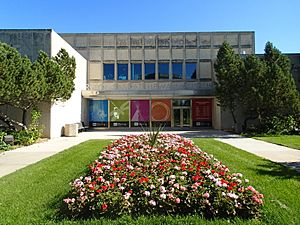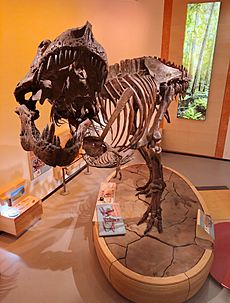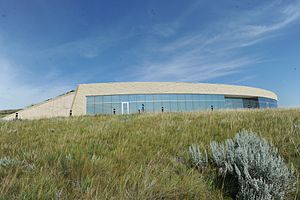Royal Saskatchewan Museum facts for kids
 |
|
 |
|
| Lua error in Module:Location_map at line 420: attempt to index field 'wikibase' (a nil value). | |
| Former name | Saskatchewan Museum of Natural History |
|---|---|
| Established | 1906 |
| Location | 2445 Albert Street Regina, Saskatchewan, Canada |
| Type | Natural history |
| Collection size | 3,500,000 |
| Visitors | 139,122 (2017) |
| Owner | Government of Saskatchewan |
The Royal Saskatchewan Museum (RSM) is an exciting natural history museum located in Regina, Saskatchewan, Canada. It was founded in 1906, making it the very first museum in Saskatchewan. It was also the first provincial museum among the three Prairie provinces. The museum was created to find and protect natural history items, along with objects that show history and different cultures.
The museum was first known as the Saskatchewan Museum of Natural History. In 1993, it received a special honor from Queen Elizabeth II. Because of this, its name was changed to the Royal Saskatchewan Museum.
Contents
Museum History and Growth
Between 1906 and 1945, the museum was located in several different buildings. These included the Regina Trading Company Building and the Provincial Legislative Building. During World War II, the museum's collections were put away for safety. They were stored in different buildings and were not on public display. The collections finally returned to public view in 1946.
In 1953, the government started building the museum's current home. This new building was a special project for Saskatchewan's Golden Jubilee. It opened on May 16, 1955. To show what the museum focused on, it was called the Saskatchewan Museum of Natural History. This name stayed until 1993. That's when Queen Elizabeth II gave it the "Royal" title, and it became the Royal Saskatchewan Museum.
The museum's collection faced challenges over the years. In 1912, a big storm called the Regina Cyclone badly damaged many items. In 1990, a fire in the First Nations Gallery caused more damage. The museum had to close for four months because of smoke. Since then, the museum has been greatly improved. New galleries have been built, and old ones have been updated.
Exploring the Museum Galleries
The Royal Saskatchewan Museum has amazing galleries that show off different parts of Saskatchewan's history and nature.
Earth Sciences Gallery
The Earth Sciences Gallery tells the story of Saskatchewan's ancient past. You can learn how the Earth's formation gave Saskatchewan its rich mineral resources. The gallery also features giant reptiles, dinosaurs, and other extinct creatures. These amazing animals lived in Saskatchewan over the past two billion years.
CN T. rex Gallery
On May 17, 2019, a life-size model of Scotty went on display. Scotty is known as the world's largest T. rex. This impressive cast is in the two-story CN T. rex Gallery. This gallery is part of the museum's Earth Science gallery.
Scotty was first found by a Royal Saskatchewan Museum team. This happened in Saskatchewan's Frenchman River Valley on August 16, 1991. The actual fossil, known as RSM P2523.8, is now shown in two places in Saskatchewan. These are Regina and Eastend. The gallery highlights the injuries Scotty got during its long life. It also shows the plants and animals that lived alongside this huge T. rex.
First Nations Gallery
The First Nations Gallery opened on June 26, 1993. This gallery was created with help from many people. Researchers, Indigenous Elders, students, and community members all worked together. The gallery uses miniature and life-size displays. It explores the culture, traditions, trade, and communities of Saskatchewan's Indigenous people. It covers their history over the past 10,000 years.
Life Sciences Gallery
The Life Sciences Gallery has sixteen detailed, life-size displays. These show the different natural areas and seasons of Saskatchewan. This gallery opened in June 2001. It explains how different living things are connected to each other. It celebrates Saskatchewan's landscapes and many types of plants and animals. Visitors can even see what it's like inside a bear's den or a beaver's lodge!
Museum Collections
The museum has a huge collection with over 3.5 million items. This includes 3 million archaeological artifacts. There are also 250,000 insects, 37,500 fossils, and 10,000 birds. The collection also has 6,500 plants, 4,000 spiders, 3,700 mammals, 500 reptiles, and 300 fish. This large collection helps with research. It helps us learn more about Saskatchewan's natural history and Indigenous cultures.
T.rex Discovery Centre
Since February 14, 2013, the Royal Saskatchewan Museum has also managed the T.rex Discovery Centre. This center is located in Eastend, Saskatchewan. It holds many fossils from the Cretaceous and Cenozoic periods.
The T.rex Discovery Centre was built to keep the fossil records of southwest Saskatchewan safe. The town of Eastend wanted a place to show off the many fossils found in the Frenchman River Valley and the Cypress Hills. The T.rex Discovery Centre opened in 2001. It is just north of Eastend in the Frenchman River Valley.
Museum Affiliations
The Royal Saskatchewan Museum is connected with several important groups. These include the Canadian Museums Association and the Canadian Heritage Information Network. It is also part of the Virtual Museum of Canada.
Images for kids
-
A triceratops skull
-
A triceratops skull
-
Treaty 4: This pictograph is special. It is the only one of its kind in Canada about treaties between the Crown and First Nations.
See also
 In Spanish: Museo Royal Saskatchewan para niños
In Spanish: Museo Royal Saskatchewan para niños













